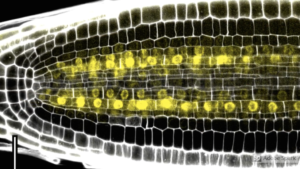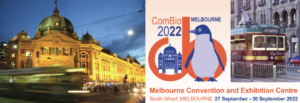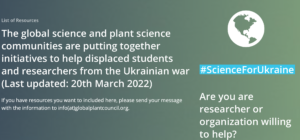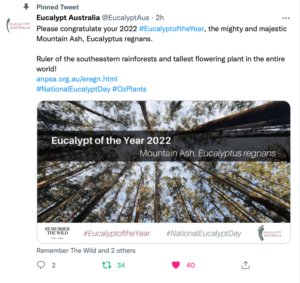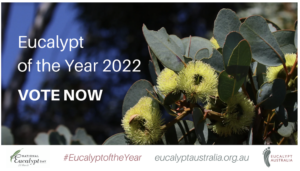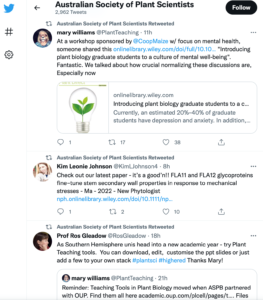- About
- Members
- Join
- Member log in
- Membership Renewal
- Member directory
- Life Members
- ASPS Life Member Professor Graham Farquhar
- ASPS Life Member Associate Professor Hendrik (Hank) Greenway
- ASPS Life Member Dr Marshall (Hal) D Hatch
- ASPS Life Member Dr Paul E Kriedmann
- ASPS Life Member Dr Mervyn Ludlow
- ASPS Life Member Emeritus Professor Rana Munns
- ASPS Life Member Conjoint Professor Christina E Offler
- ASPS Life Member Professor (Charles) Barry Osmond
- ASPS Life Member Emeritus Professor John W Patrick
- ASPS Life Member Dr Joe Wiskich
- Corresponding Members
- Elected Fellows
- Events
- Awards & Funding
- Employment
- Publications
- Research
- Teaching
- Menu
25 May 2022
Hi ASPS members,
May Phytogen can be accessed HERE.
The local ASPS organising committee would like to gently remind you that early bird registration for ComBio 2022 (Melbourne, 27-30th Sept) closes June 24th.
This conference is a great opportunity to meet friends and colleagues face-to-face after long periods of zoom-based interactions.
As per usual there is an excellent line up of plenary speakers. The highlight being Nobel Laureate Jennifer Doudna and the two plant-specific speakers Siobhan Brady and Niko Geldner.
Attached (ComBio2022TT) is an outline of the program.
The plant stream symposia are as follows:
EXTRACELLULAR MATRICES
PLANT DEVELOPMENT
PLANT GENOMICS, GENETICS & GENE EDITING
FROM LAB TO FIELD
PHOTOSYNTHESIS & CARBOHYDRATES
PLANT WATER TRANSPORT & UTILIZATION
PLANT SUCCESS – ENLISTING THE POWER OF MODELS
REPRODUCTION & SEED BIOLOGY
PLANTS & THEIR ENVIRONMENTS
Importantly, there is also ASPS student travel support for conference attendance (application due 4 July 2022):
https://combio.org.au/combio2022/student.html
As a small favour could we ask you to print out the attached ComBio2022 flyer and distribute in your department/institute to help with advertising.
Please do come along and enjoy the science, cold/wet Melbourne and the opportunity to socialise.
Looking forward to seeing you all,
John/Ros (ASPS – LOC ComBio)
ComBio2022: 27 – 30 September 2022, Melbourne Convention and Exhibition Centre
Early Registration & Abstract Deadline: Friday, 24 June 2022
https://combio.org.au/combio2022/
After a long pause in our plans, we are very pleased to advise that the ComBio2022 online registration and abstract submission forms are now available at:
https://www.combio.org.au/cgi-bin/combio-registration-form.cgi
and
https://www.combio.org.au/cgi-bin/combio-abstract-form.cgi respectively.
This will be a full face-to-face meeting.
ComBio2022 is a combination of five societies holding their annual meetings:
Australian Society for Biochemistry and Molecular Biology
Australian Society of Plant Scientists
Australia and New Zealand Society for Cell and Developmental Biology
Genetics Society of AustralAsia
New Zealand Society for Biochemistry and Molecular Biology
The program timetable can be accessed from: https://combio.org.au/combio2022/timetable.html
You can also see the plenary speakers and their photographs and biographies at:
https://combio.org.au/combio2022/plenary.html
We are pleased to advise that this year, the very popular “Career Development Forum” will be almost a full day of sessions held on Tuesday, 27 September offsite.
Further information:
Sally Jay
combio@asbmb.org.au
May Phytogen – lets all catch up in Melbourne 2022.
25 May 2022
Welcome to Phytogen for May 2022.
________________________________________________________________________________________________________
Dear ASPS Members,
A reminder that the 2022 Annual Meeting for the Australian Society of Plant Scientists will be held in Melbourne (27-30 September) as part of ComBIO2022 (see ComBio2022 ).
ComBIO is the joint meeting of five biological and genetics societies from Australia and New Zealand. It provides us all with the opportunity to experience a much larger and exciting meeting and hear outstanding international and local speakers from the plant and animal worlds (including Nobel Laureate Jennifer Doudna). Among the wide range of symposia are streams dedicated to plant biology, signalling and evolution.
Deadline for Abstracts is Friday 24 JUNE – see the website. Please print off the attached POSTER and display it in your labs and tea rooms.
Note: Student members of ASPS who attend ComBio and present a talk or poster are eligible to receive funding to support their travel. See the attached Student-Travel-Grant-for-ComBio2022 – due 4th July 2022.
We encourage everyone to participate.
Peter.
________________________________________________________________________________________________________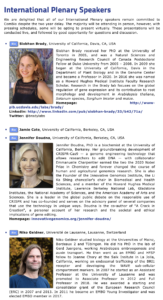
Taking a look at the Programme of Plenaries and Keynotes, 2020 Nobel Prize in Chemistry, Professor Jennifer Doudna is delivering the opening Keynote Lecture. Jennifer’s research field is gene editing and CRISPR, revolutionising agriculture and genetics. In early childhood in Hawaii, marvelling at plants is where it all began – will be very inspirational for all of us. There is also Professor Siobhan Brady from the College of Biological Sciences at the University of California, UCDavis. Here is an amazing article about growing food despite drought. Plus Professor Niko Geldner from the Department of Plant Molecular Biology, University of Lausanne, Switzerland, will be speaking about the root endodermis.
Root endodermis, Geldner Lab
________________________________________________________________________________________________________
In May there has been an interesting article growing plants with soil from the moon: Scientists Grow Plants in Lunar Soil from the 12th May 2022.
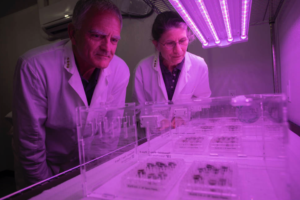
Rob Ferl, left, and Anna-Lisa Paul looking at the plates filled part with lunar soil and part with control soils, now under LED growing lights. At the time, the scientists did not know if the seeds would even germinate in lunar soil. Credits: UF/IFAS photo by Tyler Jones.
________________________________________________________________________________________________________
We wish students and teachers all the best in preparing for exams and semester assessments in coming months.

________________________________________________________________________________________________________
Women & Leadership Australia (WLA) is currently offering professional development scholarships for the Australian Society of Plant Scientists staff and members. The scholarships are open to women across all areas of the STEM sector and we encourage you to share this opportunity with your staff & members.
Women & Leadership Australia supports women leaders across all sectors and industries by providing world-class leadership development programs for emerging, middle and senior leaders. We believe that advancing gender equity, especially in leadership, is central to creating a more fair and inclusive society.
Through our Industry Partnership Framework, we work with over 500 associations and professional bodies to increase awareness and action around gender equity. With your support, we can continue to create meaningful opportunities for women leaders in your industry.
Scholarships of $1000 – $5000 per person available for women in the STEM Sector
- To encourage more women to step into leadership roles across the STEM sector, WLA is offering scholarships for 4 x leadership development courses. Apply by 10 June or find out more by clicking here – https://www.wla.edu.au/stem.html
________________________________________________________________________________________________________
PB2022 registration at lowest rates ends June 8 2022. On Demand Plant Biology Extended will be available for purchase for those not able to attend the meeting in person. More details to come…..
Please login and check your ASPS membership is up to date. Encourage your colleagues and students to join ASPS. Go to: https://www.asps.org.au/members/join
Tweet to @asps_ozplants your news and upcoming events.
April 2022 Phytogen
22 April 2022
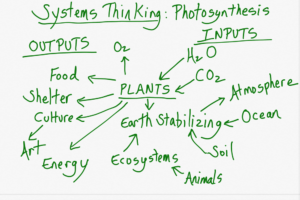 Welcome to Phytogen for April 2022,
Welcome to Phytogen for April 2022,
Our politicians are on the campaign trail and to get you thinking, here are reports from Science Meets Parliament 2022 introduced by Peter Ryan.

Science and Technology Australia (STA) is an umbrella organisation that represents 90,000 STEM professionals in Australian from ~60 member societies and associations. STA regularly surveys its members to develop STEM-related policies that are then presented to governments, private enterprises and other stakeholders. One of the major STA events organised each year is Science Meets Parliament which facilitates direct interactions between scientists, lobbyists and politicians. The participants hear talks from leading scientists and gain insight into parliamentary processes and policy development. The participants also learn from experienced staffers about how best to approach politicians and pitch ideas for maximum impact. The whole experience is a rare and valuable opportunity that will hopefully empower more researchers and academics to effectively communicate their ideas, aspirations and concerns directly to decision makers. Members of STA send two representatives to Science Meets Parliament each year and for 2022 ASPS was represented by Megan Shelden (University of Adelaide) and Benjamin Schwessinger (ANU). Their reports are attached below.
Although held in a busy part of the academic year, Science Meets Parliament is a rewarding experience. ASPS members interested in participating in 2023 should lookout for messages in Phytogen early next year.
Peter Ryan (President ASPS).
Megan Shelden, School of Agriculture, Food and Wine, Faculty of Sciences, Engineering and Technology, University of Adelaide.
I had the pleasure of representing the ASPS as a delegate at Science Meets Parliament in 2022. Due to the ongoing pandemic, the event was held online over 5 days. Despite this, I found the event to be a very valuable experience and thoroughly enjoyed the sessions.
Science meets Parliament 2022, kicked off with a wonderful Welcome to Country by Ngunnawal Elder Wally Bell. This was followed by the opening keynote address by the inspiring Nobel Laureate Professor Peter Doherty. Professor Doherty has become an avid science communicator and “twitter sensation” over the course of the pandemic. In the Professors’ words “You cannot convince everybody but you can engage anyone with respect”.
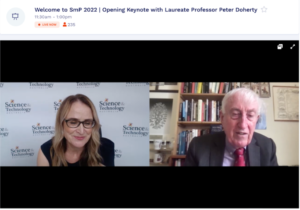
Panel sessions highlighted the need to communicate our science effectively and gave us many practical tips on how to engage with parliamentarians and really make the most of our meetings with Members of Parliament. I particularly loved the “Marie Kondo your writing” session with Mischa Schubert (CEO of Science and Technology Australia) – so many writing tips that have already helped me enormously!
 There were so many highlights in the program: Professor Brian Cox and astrophysicist Kirsten Banks gave their tips for effective science communication, the National Press Club Address by Professor Mark Hutchinson, and the final session, a commercialisation masterclass with Australia’s Chief Scientist, Dr Cathy Foley.
There were so many highlights in the program: Professor Brian Cox and astrophysicist Kirsten Banks gave their tips for effective science communication, the National Press Club Address by Professor Mark Hutchinson, and the final session, a commercialisation masterclass with Australia’s Chief Scientist, Dr Cathy Foley.
I was very fortunate to participate in a zoom meeting with Ms Kate Thwaites MP, the federal ALP member for Jagajaga, with two other Science meets Parliament delegates Dr Kelly Walton (UQ) and Dr Hamish Brown (UniMelb). We discussed the importance of food security, particularly in light of the recent floods in Australia and climate change. We also discussed the need for government to continue to invest in scientific discoveries.

I would absolutely recommend attending this event if you get the opportunity. I would love to attend Science Meets Parliament again in the future (in-person!) and am very much looking forward to the National Gala Dinner to be held in June 2022.
Benjamin Schwessinger, Research School of Biology, ANU College of Science, ANU
Politics needs Science and Science needs politicians.
As scientists is it worth our time to engage with politicians and politics? Like many other high performances high pressure professions, we scientists are time poor and too often too busy with too much busy work. So, it begs the question if adding another item to the to-do list is worth the effort.
One day early summer 2021 our ASPS president, Dr. Peter Ryan, invited members to join Science Meets Parliament 2022 (SMP22). I said “yes” of course, it being held in a far distant future without an overloaded schedule, just yet. I always had a great interest in politics and politicians as my father was actively involved in regional politics for over four decades including being major of my hometown for three. SMP is a Science and Technology of Australia flagship event that brings together scientists, public servants, policymakers, and politicians for about a week to learn from each other and to network. It all started in 1999 as a small friendly face-to-face event, yet this year’s SMP22 was unfortunately another online event due to COVID19. The event itself was a series of classic lectures, panel discussion style workshops and virtual networking events one could attend live or catch up on during the week. Besides skill building this year’s focus was on indigenous knowledge and panel members where often the who-is-who of Australian Science and Technology including multiple Nobel Laureates, CEOs, and prominent media figures. Some of the sessions worked well while others suffered from the online format, at least for me. I would have preferred to randomly bump into people, to start spontaneous conversations in hallways, and get to know people who might or might not be of benefit to know some years down the track. Path can be very short if you know the right people I learned early on in my life.
My personal highlights were the National Press Club address with Professor Mark Hutchinson and meeting parliamentarian Maria Vamvakinou.
The Press Club dinner was delicious while the address was a bit disappointing. For my taste Prof. Hutchinson’s address was too much self-involved, ego driven stardom with “bench to boardroom” talk that praised recent government investment into translational science. Of course, additional investment into science is very welcome. We in Australia clearly need to get better in converting yesterday’s wonderful basic science investment into commercial outcomes today. No question. Yet Prof. Hutchinson could have warned the audience more explicitly that we need to invest more into the whole knowledge generation to translation pipeline because without out groundbreaking basic science today there will be nothing to commercialize tomorrow.
Our group conversation with MP Vamvakinou was impressive as she came very well prepared to the discussion with clear objectives wanting to learn more and to listen. Maria was very engaged, fully on top of it, and very smart. One topic that really hit home with me is that Australia has a wide-ranging skill shortage in many STEM related sectors which holds back the economy. This was reiterated several weeks later at another National Press Club event hosting Minister for Agriculture and Northern Australia David Littleproud, which was sponsored by Crop Life.
Us scientists have a clear role to play here, at universities and other research organizations. We train the future workforce who will step into leadership roles, be it in politics, the public service or industry. Delivering world class education in STEM is a very significant contribution to Australia’s economy. Of course, our basic science has the potential to be transformational if it is supported in with the right frameworks. So, all our science needs funding and science funding needs advocacy at all levels. We as scientists need to listen to policy makers and public servants to identify joined problems and to engage in meaningful conversations. We all have our role to play, one-on-one during spontaneous hallway conversations or via our scientific societies. It is well worth our time to patiently and levelheaded illustrate the worth of our combined research pipeline to society. If not some of us who else?
In May is Fascination of plants day (FoPD22). This international event is always on the 18th May. If you would like to organise an event during May, email: georgia.koerber@adelaide.edu.au and events can be added to the events site.
Please login and check your ASPS membership is up to date. Encourage your colleagues and students to join ASPS. Go to: https://www.asps.org.au/members/join
Tweet to @asps_ozplants your news and upcoming events.
March Phytogen out now and ASPS award applications due next week.
24 March 2022
Dear ASPS Members,
The March edition of Phytogen is out now and can be accessed HERE.
Reminding you many of our ASPS award applications are closing at the end of the month.
ASPS Awards for 2022: We encourage applications for our annual awards. These include the Goldacre Medal, the Jan Anderson Award, the Robertson Travelling Fellowship and Education and Outreach Award. Deadlines are 28 March and details are available in the HERE.
ComBio 2022:
ComBIO 2022 (Melbourne, 27-20 September 2022) includes, among many others, a Plenary Address from Jennifer Doudna, the Nobel Laureate for her work on gene editing. ComBIO is a combined meeting organised by several societies involved in biological sciences. Details at https://combio.org.au/combio2022/information.html.
Importantly, student members of ASPS can apply for funding to attend this meeting and details will be released soon. Student poster prizes will also be awarded.
Thanks, Peter
Dr Peter R Ryan
President, Australian Society of Plant Scientists
Honorary Fellow, CSIRO Agriculture and Food
PO Box 1700
Canberra ACT 2601, Australia
Email: Peter.Ryan@csiro.au
Mob: 0468671565
March 2022 Phytogen – 23rd March – National Eucalypt Day :)
23 March 2022
The year is under way and hope you are managing to settle into your studies, experiments and teaching. As Peter has said ASPS awards are closing 28th March 2022:
Dear ASPS Members,
Reminding you many of our ASPS award applications are closing at the end of the month.
ASPS Awards for 2022: We encourage applications for our annual awards. These include the Goldacre Medal, the Jan Anderson Award, the Robertson Travelling Fellowship and Education and Outreach Award. Deadlines are 28 March and details are available HERE.
ComBio 2022:
ComBIO 2022 (Melbourne, 27-20 September 2022) includes, among many others, a Plenary Address from Jennifer Doudna, the Nobel Laureate for her work on gene editing. ComBIO is a combined meeting organised by several societies involved in biological sciences. Details at https://combio.org.au/combio2022/information.html.
Importantly, student members of ASPS can apply for funding to attend this meeting and details will be released soon. Student poster prizes will also be awarded.
Thanks, Peter
Dr Peter R Ryan
President, Australian Society of Plant Scientists
Honorary Fellow, CSIRO Agriculture and Food
To inspire your applications, here is an article from Joanna Melonek, ASPS 2021 Peter Goldacre Medal Recipient. You will read that the wheat genome is complex but Joanna has conveyed her work with enthusiasm making it interesting and intriguing. It is lovely that she has managed to carry out her research with such nice collaboration too.
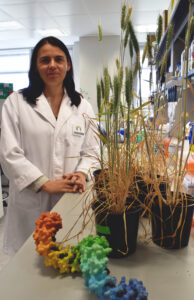
After completing PhD studies at the Christian-Albrechts-University in Kiel, Germany, in 2012 I moved to Perth to study the pentatricopeptide repeat protein (PPR) family at the ARC Centre of Excellence in Plant Energy Biology at The University of Western Australia. The aim of my research is the genomic and molecular characterisation of restorer-of-fertility-like (RFL) genes, a specific clade within the PPR family, and their application to hybrid breeding in crops.
The Peter Goldacre Medal recognises my contributions to the genome-wide analyses of the RFL clade in rice1, barley2, wheat3,4, and rye5. My analyses revealed the evolutionary plasticity of RFL genes in cereals and proposed mechanisms that drive the creation of new gene variants capable of suppressing the expression of novel mitochondrial genes that cause cytoplasmic male sterility (CMS).
Joanna with wheat plants and a 3D model of a PPR protein. Photo Karina Price.
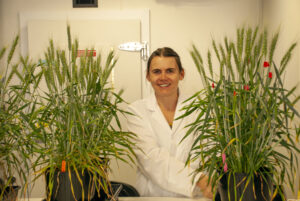
Joanna with hybrid wheat plants. Photo Julie Leroux.
Hybrid varieties, when available for a given crop, are favoured for their attractive agronomic traits and higher and more stable yields. However, for many staple crops like wheat or barley, hybrid seed production on a commercial scale remains difficult. The major limiting factor is the absence of an efficient way to control self-pollination. An approach that has been applied successfully in other crops uses CMS induced by a gene encoded in the mitochondrial genome, and nuclear RFL genes able to overcome this sterility in the hybrids (Figure 1)
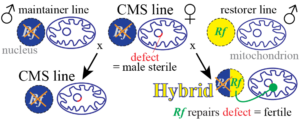
Figure 1. Three-line hybrid breeding system in cereals. The male sterile (CMS) line can be crossed to a maintainer line (left) to be perpetuated or, to generate a hybrid, exposed to pollen from a restorer line (right). This seed grows with hybrid vigour and stays fertile because the Restorer-of-Fertility (Rf) protein can repair the mitochondrial defect
Taking advantage of this recent progress in the availability of genomic resources in wheat, I developed genomics and molecular approaches that enabled the cloning of the Rf1 and Rf3 fertility restorer genes in wheat6.
We were trying to find those genes for some time, and it felt like we are looking for a needle in a haystack due to an extraordinary complexity of the wheat genome (Figure 2A). Therefore, when one day my collaborators send me a picture of transgenic plants showing the phenotype that we were looking for, we were ecstatic! (Figure 2B)
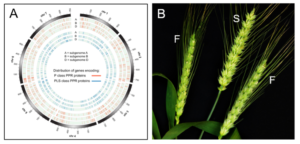
Figure 2. The extraordinary complexity of the wheat genome. A. 1686 PPR genes were identified in the wheat IWGSC RefSeqv1.0 genome. B. Picture of wheat spikes of transgenic wheat plants producing anthers (F-Fertile) and a wheat spike unable to produce anthers and functional pollen (S-Sterile). Photo Laurent Beuf (Group Limagrain).
With the assistance of researchers from Limagrain (the 4th largest seed-producing company in the world), I was able to show that both genes are able to restore fertility of wheat plants carrying Triticum timopheevii-type CMS (T-CMS). Furthermore, I was able to identify orf279 as the mitochondrial gene responsible for preventing pollen production in wheat and causing sterility. The discoveries described in the article were the basis of two patent applications and are currently used by Limagrain in their hybrid breeding programmes.
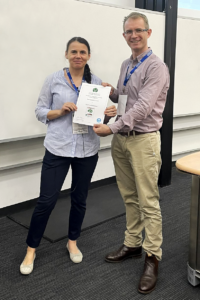
The Peter Goldacre Medal is a great recognition and confirmation from my peers and the broader plant scientific community that they find my work interesting. Therefore I’m truly honoured and thankful to the Australian Society of Plant Scientists and the very vibrant plant community in Australia for it. Of course, this all would not have been possible without the support from many people who accompany me on my scientific journey, and I’m very grateful to all of them for that!
Joanna receiving the Peter Goldacre Medal. Photo Muhammad Kamran.
References:
- Melonek J et al. (2016) Evolutionary plasticity of restorer-of-fertility-like proteins in rice. Sci Rep. 24:35152. doi:10.1038/srep35152
- Melonek J et al. (2019) High intraspecific diversity of Restorer-of-fertility-like genes in barley. Plant J. 97(2):281-295. doi:10.1111/tpj.14115.
- The International Wheat Genome Sequencing Consortium (2018) Shifting the limits in wheat research and breeding using a fully annotated reference genome. Science. 361(6403). doi: 10.1126/science.aar7191.
- Walkowiak S et al. (2020) Multiple wheat genomes reveal global variation in modern breeding. Nature. 588:277-283. doi: 10.1038/s41586-020-2961-x.
- Rabanus-Wallace MT et al. (2021) Chromosome-scale genome assembly provides insights into rye biology, evolution, and agronomic potential. Nat Genet. 53:564-573. doi:10.1038/s41588-021-00807-0.
- Melonek J et al. (2021) The genetic basis of cytoplasmic male sterility and fertility restoration in wheat. Nat Commun. 12(1):1036. doi: 10.1038/s41467-021-21225-0.
Fascination of plants day (FoPD22) is approaching in May. This international event is always on the 18th May.
If you would like to organise an event during May anywhere in Australia, email: georgia.koerber@adelaide.edu.au and events can be added to the Australian site. 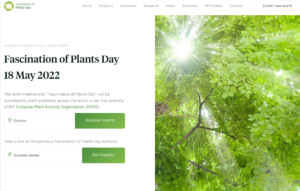
Due to Covid-19, events for all countries the last couple of years have been disrupted and recent posts in the lead up to FoPD2022 take a look back featuring many countries events from years prior to COVID. The one in 2019 with Ukraine is poignant.
Since the very beginning of March 2022, the European Plant Science Organisation (EPSO), the American Society of Plant Biologists (ASPB) and several international scientists have been calling for labs to offer temporary and permanent positions for Ukrainian scientists and students. ASPS is also investigating whether we can arrange something more formally as a society.
The Global Plant Council has a webpage of resources: https://globalplantcouncil.org/resources/resources-for-refugees-of-the-ukrainian-war/
Lastly, 23rd March is National Eucalypt Day! Congratulations Eucalyptus regnans #EucalyptoftheYear
Phytogen February edition
28 February 2022
Hello ASPS members,
Phytogen February edition can be found HERE.
Phytogen February 2022 – Awards, Pasture and Trees
25 February 2022
Welcome to Phytogen for February 2021. In this issue:
-
-
-
ASPS Awards closing dates in March 2022, Education and Outreach closes in April 2022
-
R.N. Robertson Travelling Fellowship
-
Jan Anderson Award and Education and Outreach Award
-
AW Howard Memorial Trust Grants and Awards
-
Upcoming events
Voting closes 20th March 2022
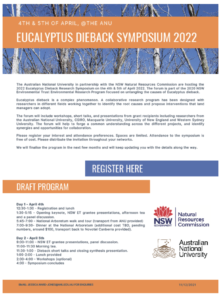
-
Paper to read – the Global Plant Council has lots to read including this article about trees.
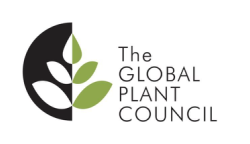
-
ASPS Society awards are Open:
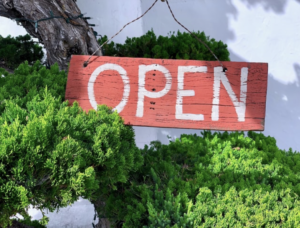 The closing date for the 2022 Peter Goldacre award is March 28th 2022 Click: Details.
The closing date for the 2022 Peter Goldacre award is March 28th 2022 Click: Details.The closing date for the 2022 Jan Anderson 2022 award will be March 28th 2022 Click: Details
Applications for the 2022 RN Robertson Fellowship will close 25 March 2022. To be eligible for this fellowship round the planned work must take place in 2022 Click: Details
Applications for the 2022 ASPS Education and Outreach Award are now open. The closing date for the 2022 award is April 16th 2022. Click: Details
Here are reports from last years award winners
R.N. Robertson Travelling Fellowship
Xiaoyang Wei, University of Newcastle
After 3 years of my HDR candidature at the University of Newcastle as a China Scholarship Council student, I returned to China in January 2020 for a two-week holiday to visit my parents who live near Wuhan in Hubei Province. As we all know now, I unwittingly flew into the disaster of the Covid-19 pandemic. Due to the initial lockdown in China, and then the border closures and Australian travel restrictions, I have been stuck in China since then, unable to return to Newcastle. Because of the Covid-19 breakout, all the academic institutes and Universities in China applied tight controls to address the challenge from Covid-19. Consequently, I had no access to any laboratory to conduct my PhD research. Luckily, quick and decisive actions were taken by Chinese government, and the pandemic was totally under control in March and life in China, particularly in Wuhan, gradually came back to normal after a two month-long nation-wide lockdown.
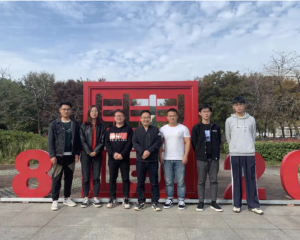
Figure 1. Photo with Dr Huang and his students at HZAU in Wuhan. From left to right, Changjin Liu, Jianuo Xu, Mu Xiong, Dr Yuan Huang, myself, Xiangshuang Wu and Jiangfeng Liu.
In July 2020, university campuses in China gradually reopened, which provided me a chance to work as a visiting scholar in a biological laboratory. Dr Lu Wang at The University of Newcastle introduced me to Dr Yuan Huang from the Huazhong Agricultural University (HZAU) in Wuhan, China. Dr Huang had previously worked as a visiting scholar in Professor Sergey Shabala’s lab at the University of Tasmania for one year (2017-2018) and now is an associate professor at HZAU. A major focus of his lab’s work is on vascular reconnection mechanisms in grafted cucurbit species. With support from the Core Facilities and Service Centre of the College of Horticulture & Forestry Science of HZAU, his lab has access to a full set of facilities for cell biology research, such as a several Leica fluorescence microscopes, vibratome, freezing microtome, ultra-thin semiautomatic microtome, etc. Access to Dr Huang’s lab enabled me to continue my PhD research overseas, and this was possible, to a large degree, because I received an R.N. Robertson Travelling Fellowship from the Australian Society of Plant Scientists (ASPS). This assisted with research costs, and allowed me to continue and then complete my PhD project in Dr Hunag’s laboratory at HZAU in Wuhan. Working at HZAU has given me an opportunity to gain new experiences in using different facilities particularly in handling with fluorescent microscopes and microtomes, which not only enriched my skills but also broadened my insight in plant cell biology research. However, working with Dr Huang’s group at HZAU has also allowed me to transfer many of the skills that I learned while at Newcastle to colleagues in China.
At HZAU, my PhD research mainly involved in investigating the fine-scale spatial relations between the wall ingrowth deposition in phloem parenchyma (PP) transfer cells (TCs) and other types of phloem cells in leaf minor veins in Arabidopsis. Confocal imaging of Vibratome cross sections and orthogonal reconstruction of minor veins was used to survey the leaves of the Col-0 accession, and also in the transgenic lines pAtSWEET11::AtSWEET11-GFP and pAtSUC2::AtSTP9-GFP which mark the PP and companion cells (CC) respectively. This analysis revealed, unexpectedly, that wall ingrowth deposition was more abundant in PP TCs positioned abaxially in the phloem compared to those positioned adaxially, implying differing contributions to phloem loading across minor veins within the leaf. This arrangement would, however, match recent studies in maize which have suggested that phloem loading occurs more from the lower side of the vascular bundle. Wall ingrowths in PP TCs were initiated exclusively at the interface adjacent to sieve elements (SEs), and the deposition of wall ingrowths adjacent to SEs was more abundant than that seen along PP TC/ CC interfaces in mature minor veins. Furthermore, only PP cells that were adjacent to SEs had wall ingrowths. As AtSWEET11-GFP levels were significantly higher in PP TCs with wall ingrowths, compared to PP cells without these structures, this further supports the role of wall ingrowths in facilitating phloem loading. These results constitute a major section of Chapter 3 of my thesis (submitted December 2021) and the work is now being prepared for publication.
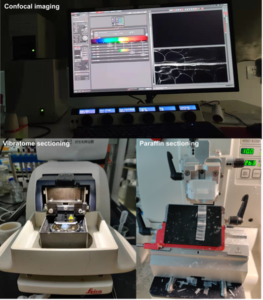
Figure 2. Confocal imaging and section preparations.
I have also conducted bioinformatics analysis using recently published single cell RNA-seq datasets and unpublished RNA-seq datasets from our Newcastle group, and then generated a list of candidate genes that are potentially involved in wall ingrowth deposition. A role for a sub-set of these genes in PP TC development was then assessed using relevant T-DNA insertional mutants. It is worth mentioning that seed lines for all tested T-DNA insertional mutants were obtained from the Arabidopsis stock centre in China called ‘AraShare’, which saved me considerable time in getting access to T-DNA lines, rather than sourcing them from ABRC. Results from this bioinformatics study which I completed while at HZAU has become Chapter 5 of my thesis.
I give my sincere acknowledgements and thanks to the ASPS for funding my project and I am grateful to the legacy of Professor R.N. Robertson for this opportunity. In a large part, this Fellowship allowed me to continue my PhD research while exiled in China. Many thanks to Dr Yuan Huang and all the students in his lab for their help and friendship at HZAU.
Jan Anderson 2021
Kim Johnson, La Trobe University
I almost didn’t apply for the Jan Anderson Award in 2021. Melbourne had experienced 6-months worth of lock-downs in 2020, home schooling had managed to destroy any semblance of work-life balance and I hadn’t had time to reflect on my academic achievements. With encouragement from mentor and collaborator Professor Tony Bacic, I took stock and realised that, by maintaining strong relationships (remotely!) with my research team, national and international collaborators, we had made significant progress in understanding the role of a group of plant cell wall proteins called hydroxyproline-rich glycoproteins, or HRGPs. I have been fascinated with wall (glyco)proteins for most of my career and have sought to understand how they play such important multifunctional roles in cell wall structure, wall integrity sensing and signalling during development and in response to stress. It is a privilege to work with people who share your scientific passion and to have the recognition of ASPS for these achievements was a real honour. I was delighted to be able to accept the award in person in Melbourne and felt the amazing support of the ASPS community linking in. The Jan Anderson award is a positive way for the society to show its commitment to improving equity, diversity and inclusion now and into the future.
Education and Outreach 2021
Kim Johnson and Monika Doblin, La Trobe University
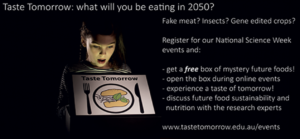
What will you be eating in 2050 when the world’s population reaches 10 billion? Fake meat? Insects? Gene-edited crops?
These were the types of questions we posed to students, teachers and the public during ‘A taste of tomorrow’, a series of education and outreach activities held in August 2020 hosted by La Trobe University for National Science Week. Activities included live online events with audience participation through polls and Q&A, a ‘future food box’, social media videos, and a website providing educational resources (https://www.tastetomorrow.edu.au).
The main aims of the project were to show that sustainable agriculture and nutrition are essential goals of human endeavour and their delivery is complex, that there are multiple stakeholders, no single correct policy and there is a need for compromise. Involvement of researchers from a range of disciplines aimed to show that science is a human endeavour, scientists are approachable and everyday people just like the audience, and learning about plants and animals is fun for its own sake.
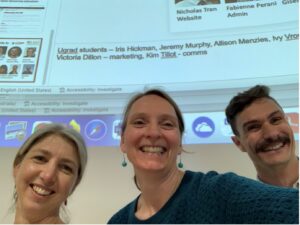
To raise awareness of the events, the La Trobe communications team posted fourteen videos, articles and profiles of researchers and students within the areas of biology, ecology, nutrition, physiology and agronomy, that were viewed over 15,000 times. A website was established to provide authenticity and community resources. The website was the point of contact for attendee registrations and supporting information such as future food ‘fact files’, blogs written by La Trobe students that include researcher interviews, recipes, experiments and school activities.
Kim Johnson and Monika Doblin, La Trobe University, Mike Haydon, University of Melbourne.
An important part of our events was a free mystery box of ‘future foods’ containing alternative food snacks delivered in advance to registrants. This engaged a wide variety of audiences with 1,000 boxes sent all over Australia. The boxes were particularly popular with teachers who could see the attraction for engaging students and using future food as a talking point for many areas of the curriculum. Three events were held during Science Week (15-23 Aug) and a launch event on the 5 August, attended by approx. 3000 people. Each involved 5-6 panellists from different disciplines (agriculture research, ecology, psychology, nutrition, sports, farming), and an MC who took the audience through a series of hypothetical future scenarios and food tastings. Feedback from the project showed that the events led to changing attitudes about food and sustainability and the importance of research to our future food security.
We sincerely thank ASPS for recognising our efforts to innovatively engage with the next generation of Australian researchers to raise awareness of the necessity to undertake multi-disciplinary research to solve complex societal issues such as meeting the nutritional requirements of the world’s growing population.
Pasture research funding opportunities now on offer

A fresh suite of grants, awards and scholarships are now on offer through the AW Howard Memorial Trust Inc.
The Trust’s various awards encourage and promote research and investigation in the fields of natural science and social science (including economics) which relate to the development, management and use of pastures.
Established in 1964 to commemorate the unique contribution of Amos Howard in the discovery and use of subterranean clover as a pasture plant in Australia, the Trust twice a year seeks grant applications from the research and academic community.
Applications are currently being sought for AW Howard Memorial Trust Early-Career Research Grants, Grants-In-Aid, Honours and Masters Scholarships, Study Awards, and Pastoral Industry Extension Awards:
-
-
- Early-Career Research Grants support research activities that improve the development, management and use of pastures. Grants are limited to $15,000 each.
- Grants-In-Aid, limited to $5000 each, are awarded to projects that: commemorate important contributions to pastoral sciences or industry; distribute scientific innovations to develop pasture use within Australia’s regions; invite prominent overseas pasture scientists to Australia to deliver keynote addresses at relevant conferences or visit regional scientists and community groups involved in pastoral industries; or need essential equipment for pastoral scientific research and development.
-
- Honours and Masters Scholarships are for projects that facilitate pasture research. Each scholarship offers a stipend of $5000 and operating expenses of $3000. Eligible recipients must be intending to commence approved Honours or Masters tertiary studies with any Australian university.
- Study Awards of up to $5000 are awarded to scientists to undertake overseas study tours or participate in national or international conferences. Tours and conferences must be related to pasture research and within the aims of the Trust.
- The Pastoral Industry Extension Study Awards, worth up to $20,000 each, aim to support study tours that examine successful grazing systems and practices and have the potential to benefit Australian pastoral industries and rural communities.
-
Applications for all the afore mentioned awards close on March 31.
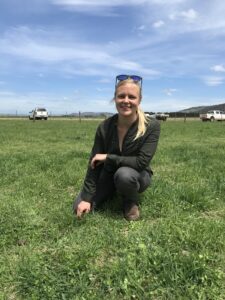
Former Early-Career Research Grant recipient Dr Beth Penrose strongly encourages others to apply for the funding on offer.
“The funds received through the Trust allow recipients to test their research ideas, build grant track records, be the foundation for larger projects, and help farmers at the same time,” said Dr Penrose, who is a Lecturer in Pasture Science at the University of Tasmania.
Dr Penrose used her grant, awarded in 2020, to investigate the effect of soil nutrients on nodulation of white clover and the status of the white clover seed bank of Tasmanian dairy pastures.
The Grant enabled Dr Penrose to engage Honours student Will Coad who worked closely with farmers during the investigation and has since found employment as a pasture agronomist in Tasmania.
Former Early-Career Research Grant recipient Dr Beth Penrose. Photo: Lesley Irvine.
Originally from the United Kingdom, Dr Penrose said attracting funding for research without an Australian funding record was difficult, so the support provided through the Howard Trust had been invaluable.
“It allowed me to undertake preliminary research and has been the catalyst for other pasture-related grants.
“It is fantastic that the Howard Trust is focused on pasture-related studies as there aren’t many funding opportunities focused just on pasture.”
The not-for-profit AW Howard Memorial Trust has awarded more than 400 grants of various descriptions since it was established in 1964 by the then Australian Institute of Agricultural Science (now Ag Institute Australia) through donations from benefactors.
The Trust is managed by a committee drawn from Ag Institute Australia, The Australian
Agricultural and Resource Economics Society, the University of Adelaide, the South
Australian Research and Development Institute which is a division of the SA Department of Primary Industries and Regions (PIRSA) and scientists experienced in crops and pastures including tropical pastures.
Application forms are available on the Trust’s website, https://bit.ly/3f3Pxkw. More information is available via the Trust’s executive officer, email howard.trust@sa.gov.au.
Upcoming events
Please login and check your ASPS membership is up to date. Encourage your colleagues and students to join ASPS.
Tweet to @asps_ozplants your news and upcoming events.
-
January 2022 Phytogen – Society awards are open !
21 January 2022
Welcome all to 2022.
Last year as a society there were plenty of activities. So much so, I hope you have all managed to have a rest in preparation for 2022.
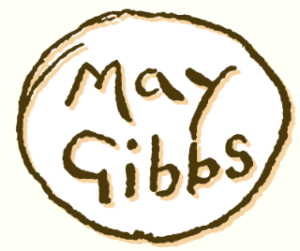
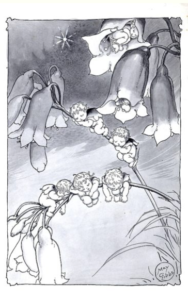
This year will have highlights of face to face scientific meetings.
There will be ComBio2022 in Melbourne in September and IPMB2022 in Cairns in October.
It will be a wonderful opportunity for students and colleagues to catchup.
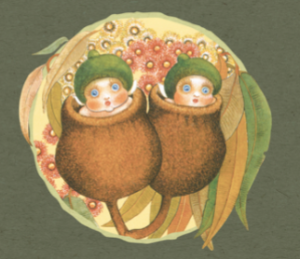
We wish all the best to students in their studies this year, to teachers preparing their learning activities for students and to researchers for their experiments this year.
Society awards are Open:
The closing date for the 2022 Peter Goldacre award is March 28th 2022 Click: Details
The closing date for the 2022 Jan Anderson 2022 award will be March 28th 2022 Click: Details
Applications for the 2022 RN Robertson Fellowship will close 25 March 2022. To be eligible for this fellowship round the planned work must take place in 2022 Click: Details
Applications for the 2022 ASPS Education and Outreach Award are now open. The closing date for the 2022 award is April 16th 2022. Click: Details
Please login and check your ASPS membership is up to date. Encourage your colleagues and students to join ASPS. Go to: https://www.asps.org.au/members/join
Tweet to @asps_ozplants your news and upcoming events. There is already lots of great activity at https://twitter.com/asps_ozplants – check it out.
ASPS 2022 awards open and December Phytogen
10 December 2021
Hello ASPS members,
The December edition of Phytogen has been published and can be viewed HERE!
The ASPS awards are now open.
The Peter Goldacre Award applications close 28th March 2022. Details HERE.
The Jan Anderson Award applications close 28th March 2022. Details HERE.
The RN Robertson Travelling award applications close 25 March 2022. Details HERE.
The ASPS Student conference travel awards applications close 28 June 2022. Details HERE.
Recent Posts
Tags
Archives
- June 2025
- May 2025
- April 2025
- March 2025
- February 2025
- January 2025
- December 2024
- November 2024
- October 2024
- September 2024
- August 2024
- July 2024
- June 2024
- May 2024
- April 2024
- February 2024
- January 2024
- November 2023
- October 2023
- September 2023
- August 2023
- July 2023
- June 2023
- May 2023
- April 2023
- March 2023
- February 2023
- December 2022
- November 2022
- October 2022
- September 2022
- August 2022
- July 2022
- June 2022
- May 2022
- April 2022
- March 2022
- February 2022
- January 2022
- December 2021
- November 2021
- October 2021
- September 2021
- August 2021
- July 2021
- June 2021
- April 2021
- March 2021
- February 2021
- January 2021
- December 2020
- November 2020
- October 2020
- September 2020
- August 2020
- July 2020
- June 2020
- May 2020
- April 2020
- March 2020
- February 2020
- January 2020
- December 2019
- November 2019
- October 2019
- September 2019
- August 2019
- July 2019
- June 2019
- May 2019
- April 2019
- March 2019
- February 2019
- January 2019
- December 2018
- November 2018
- October 2018
- September 2018
- August 2018
- July 2018
- June 2018
- May 2018
- April 2018
- March 2018
- February 2018
- January 2018
- December 2017
- November 2017
- October 2017
- September 2017
- August 2017
- July 2017
- June 2017
- May 2017
- April 2017
- March 2017
- February 2017
- January 2017
- December 2016
- November 2016
- October 2016
- September 2016
- August 2016
- July 2016
- June 2016
- May 2016
- April 2016
- March 2016
- February 2016
- January 2016
- December 2015
- November 2015
- October 2015
- September 2015
- August 2015
- July 2015
- June 2015
- May 2015
- April 2015
- March 2015
- February 2015
- January 2015
- December 2014
- November 2014
- October 2014
- September 2014
- August 2014
- July 2014
- June 2014
Copyright 2017 Australian Society of Plant Scientists Disclaimer & Privacy
Website by Michael Major Media

